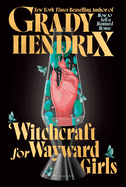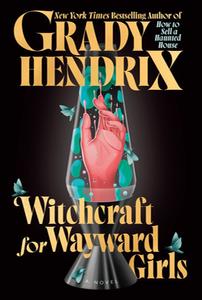
 Horror novelist Grady Hendrix (How to Sell a Haunted House; The Final Girl Support Group; Horrorstör) presents Witchcraft for Wayward Girls, another unsettling--and yet somehow hilariously funny--story that'll keep even the most seasoned horror fan up at night.
Horror novelist Grady Hendrix (How to Sell a Haunted House; The Final Girl Support Group; Horrorstör) presents Witchcraft for Wayward Girls, another unsettling--and yet somehow hilariously funny--story that'll keep even the most seasoned horror fan up at night.
In the summer of 1970, a pregnant 15-year-old finds herself abandoned by her disapproving father at Wellwood House, a place in St. Augustine, Fla., where "loose," unwed mothers are taken by their families to give birth away from prying eyes. Given the name Fern by Miss Wellwood to ensure that no one knows her real identity, this latest unwed mother joins the ranks of other teenaged girls who are meant to birth their babies, give them up for adoption, and promptly forget that any of this ever happened.
But Fern and her fellow inmates can't just accept what is happening to them; their bodies are revolting against them and everyone at Wellwood's is determined to subjugate them by any means possible. After receiving an occult book from a visiting librarian, Fern begins to think that the witchcraft she reads about in its pages might be the answer to helping not only herself but the girls who are quickly--and unexpectedly--becoming her friends. Too bad even witchcraft doesn't come without strings attached. Now, the countdown is on for Fern to decide whom her body truly belongs to.
Infused with humor that is perhaps even more biting than the average Hendrix adventure, Witchcraft for Wayward Girls makes the most of its equal-parts kitschy and compelling setting in sweltering 1970s Florida. But even as the girls at Wellwood's inspire some laughs, pontificating about "the Man" and staring at hypnotic lava lamps, they nonetheless inspire completely unironic loyalty as their personalities develop in surprisingly tender ways. Meanwhile, the historic truth of the situation they find themselves in--that is, unwed mothers at abusive homes that moralize to their patients, take their babies with questionable consent, and drug them past recognition during labor--is fully and disturbingly realized.
In fact, it is this cultural history alongside the painfully accurate descriptions of pregnancy that create the novel's real horror, nightmare-inducing in its specificity. But just as pregnancy creates the foundation for the horror in Witchcraft for Wayward Girls, it also becomes the basis of its characters' self-discovery and salvation. Pregnancy, like witchcraft, may be a source of fear for many, in how it can transform one's body into something unrecognizable and uncontrollable. But it can also be the embodiment of power, especially for those who may not yet fully recognize who they are but still refuse to be controlled by others. --Alice Martin, freelance writer and editor
Shelf Talker: Witchcraft for Wayward Girls is a horrifying and humorous send-up of the culture surrounding unwed mothers in the 1970s that is both timely and timeless.

